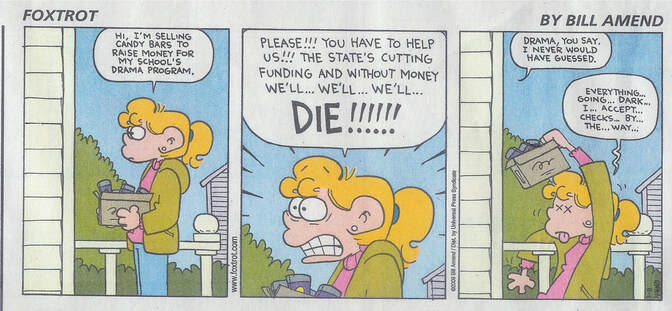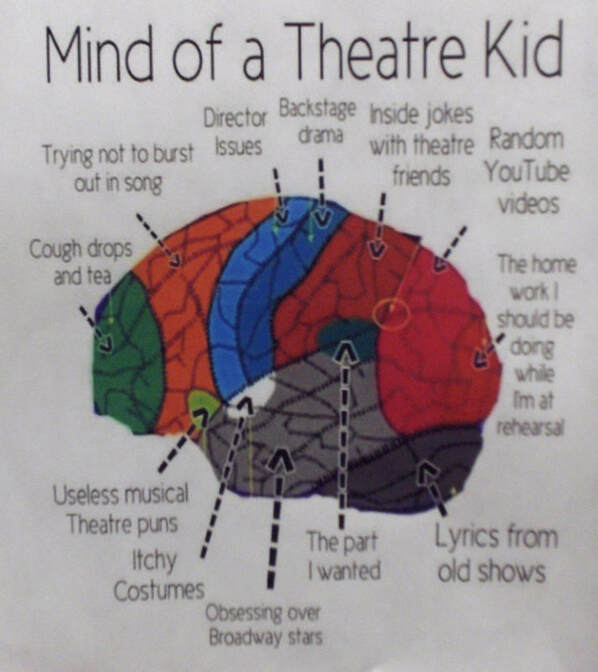One of my favorite professors (as an undergraduate) once said to me that a director can be wrong many times, but he/she always has to always be so with authority because nothing upsets a cast more than the director being "wishy-washy." I think what Mr. Kinzer meant was that nothing is more destructive than to sense that your leader is thrashing around with no idea of how to approach fixing the problem. Therefore, it's better (as a leader) to be positively incorrect several times, because that shows that you are at least actively dealing with the situation. I think that works in most fields. In, perhaps, simpler terms, a good director should say, "That (bit, business, line reading, whatever isn't right) just isn't working. Next time, try it this way." She/he should not stop after the first statement. If the comment is worth making, it needs a conclusion. Then, if THAT doesn't work, try the same thing with a different idea.
Dean Robert Kherberg (Yes, if you didn't know it, the former Head of the Dept. of Music eventually became the Founding Dean of the College of Fine and Performing Arts at Western.) once suggested to me that "Not all pieces of music deserve to be played more than once." That got me to thinking about how that idea might relate to the Theatre. So, I thought about the many productions I have been involved with in some capacity. What I came up with was:
Most scripts are probably worth doing once!
Some scripts are worth doing many times.
Some scripts are best forgotten after a quick reading.
Think about it. I suspect you'll agree with me.
Another thought of mine: Theatre is a TEAM sport! Gordon Craig got it wrong. (I do have to give Bonnie credit for inspiring this thought.) This notion MAY be too subtle for some (although I think it's true). If you don't understand my point, keep in mind that Gordon Craig was an advocate of the idea of the "Master Artist" and the "Ubermarionette." That may help. I think that's why I was always (still am) more enamored with the somewhat similar ideas/theories of Adolphe Appia, which have a greater emphasis the concept of production unity.
I used to express much the same idea in teaching by suggesting that the best script, the best cast, directed by the best director are still just a bunch of people stumbling around in the dark until somebody (a “techie”) turns on the lights. We all need each other.
Some people have used Appia's ideas to justify a director or designer's "right" to "mold the material into their message." They sometimes call this "conceptual" production.
Now, the way I learned it; a "concept" was a common understanding-agreement of the intent of the production. I'm afraid that many of the "big concept” pieces which I have encountered derive from someone trying to do the play THEY WANT to do, rather than the one the playwright wrote. I would suggest that if you want to write the play, write the play! At least admit that your production is "Adapted from a play by (whoever wrote the original)." Don't force YOUR ideas into some playwright's work, because it might sell more tickets. Even if it isn't a violation of copyright laws, it's dishonest thinking.
I firmly believe that, in order to achieve an even generally acceptable production, First, you read the play! This sounds simple and obvious, but that's a good deal less obvious and more complicated than it seems at first glance. Reading a play is MUCH more than just reading the words on the page or counting up how big your part is. I wrote a whole book/pamphlet about what that phrase means and an approach to accomplishing it! (If you are interested, I'll send you a copy, just let me know.) Actually, reading a play is rarely, if ever, accomplished in one pass through the text and requires a good deal of dedication, at least if the script is worth paying any attention to. On the other hand, spending the time and effort to actually read the play thoroughly before doing anything else with it, will tend to save much time and effort later in the production process.
Finally, thinking back on the days I spent in a touring repertory company while working on my Masters' degree, I think I should point out that: "There are few situations which cannot be improved by a nap." Having made that statement, I should include the corollary to it, which is that: "A carpeted, raked, auditorium aisle can be a perfectly acceptable place for that nap, and can even be pretty comfortable." (I speak from experience.) I would suggest sleeping towards the side of the aisle to avoid traffic and that you lie with your head higher than your feet, but you can choose your own favorite position.
Mostly remember to "Break a leg!" That's what theatre people do! And, if you do it correctly, it doesn't even hurt.
LLAP
Dr. B
P.S. There are other things the theatre taught me, but they can wait for later. See you in a couple of weeks when I think I'll be back on my usual schedule. RSB


 RSS Feed
RSS Feed